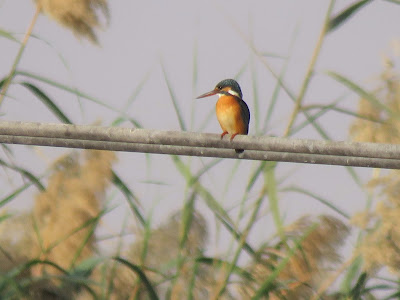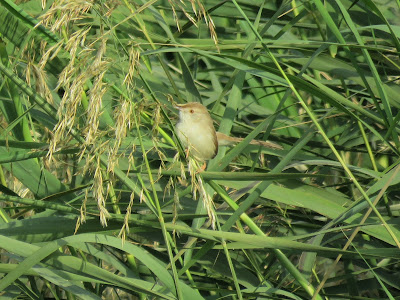The House Sparrows were about and not too bothered by the noise. Good numbers of them were to be seen high in the branches of the trees so I assume its breeding time again.
The White Eared Bulbul were about in fine voice too and also looking like they were starting to pair up. That said seeing them in pairs is not unusual at any time of the year.
Seeing a Black Scrub Robin in the area is not that unusual, although this week there were 6 or 7 of them about which is a little unusual I think. Nice birds but hard to photograph as they prefer to stay in the trees only coming out from time to time.
A couple of Stonechat were about again today. This one was in a slightly different position this week as his favourite bush had been cut with the grass.
His female companion was at the other end of the field!
Another was spotted a bit further along the walk.
A small flock of Myna were still about making a hell of a racket this week as they went about their business.
I eventually got a photo of a Bluethroat having missed several opportunities earlier in my walk. This one actually threw me for a bit and I began to believe I had a different bird, thankfully some kind folk on Bird Forum helped clarify things for me. Its funny how the mind works when doubt gets in there.
Our little family of Moorhen were still feeding around what was left of the marshy area in the lower field. This had dried up a lot since the rains flooded the area but they were still happy.
I struggled for quite some time to get a decent photo of the Little Green Bee Eater getting more and more frustrated, then as I was looking at another bird, this guy just plonks himself straight in front of me. You gotta love this past time lol.
Right in the corner of the lower field beside the pumping station was this little Common Kingfisher. I'm not sure if it is the same one as I spotted a couple of weeks ago in the middle field but nice to see anyhow.
The White Throated Kingfisher was by far the more common of the Kingfishers around the area today. There were four individuals that I spotted and maybe more spread all over the fields.
In the fields at the other side of the river close by the farmers house was the little flock of Desert Finch which I saw a couple of weeks back.
This beautiful Purple Heron was only about 20ft away but obviously thought I could not see him. They are normally in the air and long gone well before you get anywhere near them. A number of Grey Herons were also seen on site today but I failed to get a single usable photo of any of them.
Other members of the Heron family however were about in very large numbers. The Cattle Egrets were feeding happily in the fields by the sprinkler bars. I counted 80 but there were at least 3 large flocks that flew over earlier heading for fields further south.
There were also a good number of Shrikes about with both the Daurian and Turkestan seen in reasonable numbers. Across the full length of my walk.
Once again too the Grey Shrike was present this time on the sprinkler bars near the main road. This one seems to be here fairly regularly. I'm not very well up on Shrikes but I'm sue there is some territorial thing going on here.
Another old friend that always comes out to see us on walks if the Crested Lark, once again there were good numbers of these about but many more heard than seen.
When walking around the middle field I noticed a couple of Barn Swallows performing their fantastic aerial display as they caught flies on the wing and this reminded me to go over to the farm on the other side of the river just to see if they were going to use the same breeding spot as last year. Its still three weeks earlier than I spotted them breeding last year so I thought maybe it would be still a bit early.
However, when I got around to the nest site I found there were a dozen or more birds in the area and some were gathering mud from a pool in front of the building where they nest. There was a lot of human activity with diggers and vans all over but it did not seem to bother them too much.
I entered the building (with permission) and the birds were working on 3 of the nests so it certainly appears they plan to breed. There were no eggs in any of the nests yet but will keep an eye to see how that develops.
By the way I hope to have an article published detailing my records of the first confirmed evidence of Barn Swallows breeding in the Arabian Peninsula. It will be in the spring edition of Sandgrouse for members of OSME
Look them up at OSME.org and join up, it only costs a few quid a year and they are doing great work in the region.
Anyhow also seen but not photographed were a number of eagles, Greater Spotted I think but they were very far off and a Hoopoe which evade me until I was in the car on the way back.
As I have said several times in the past, another great days birding, Al Hayer rarely disappoints.


































































